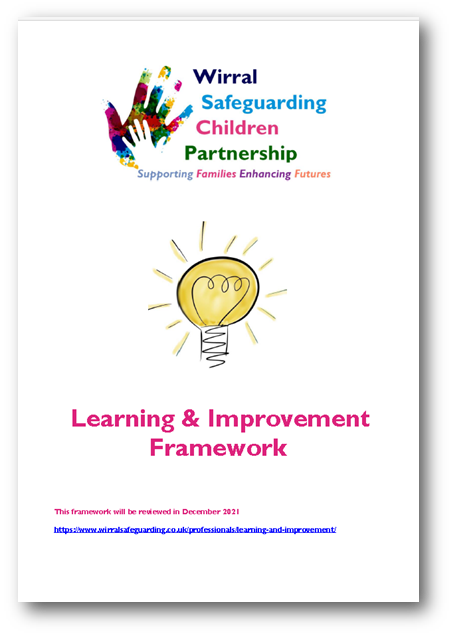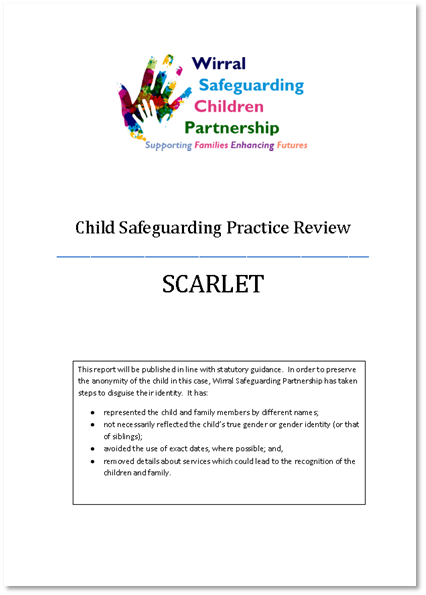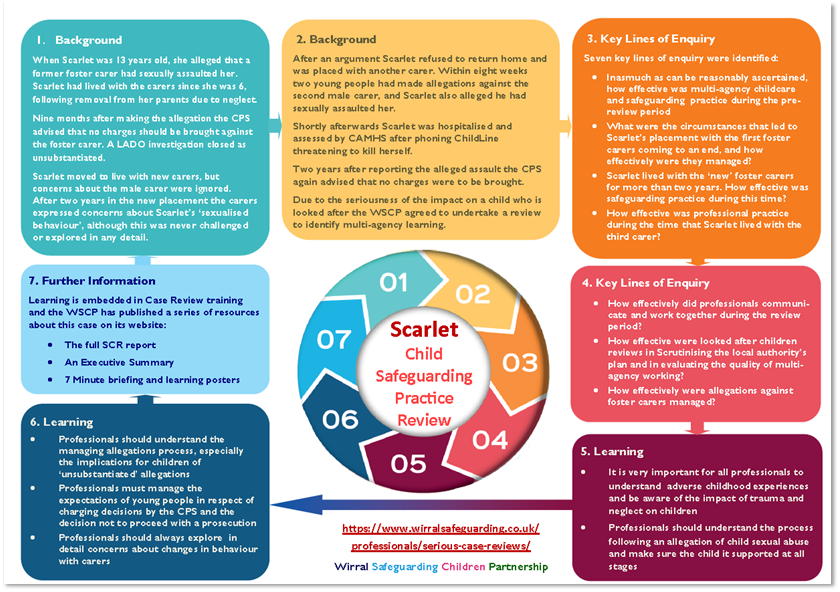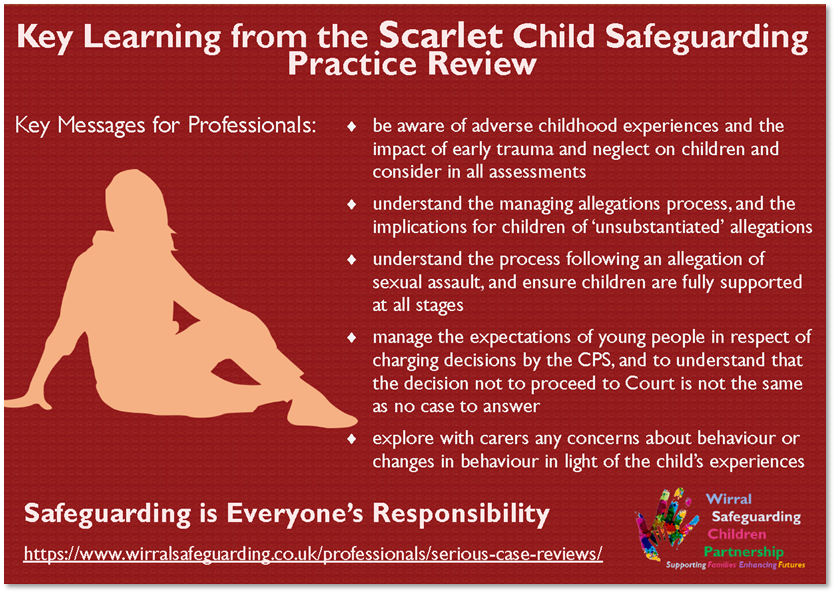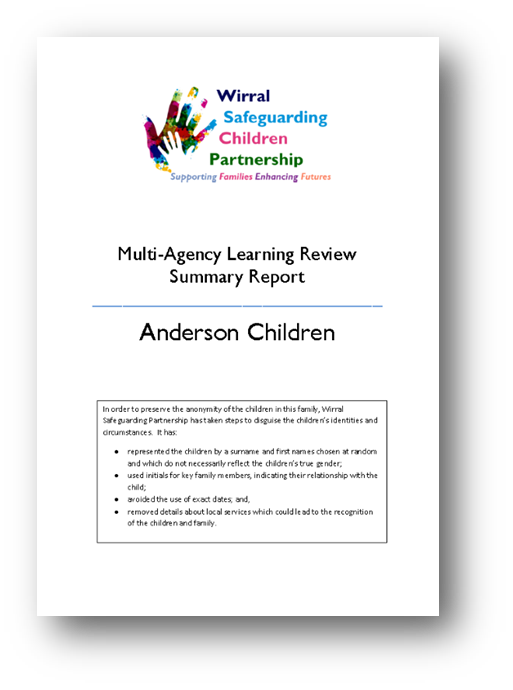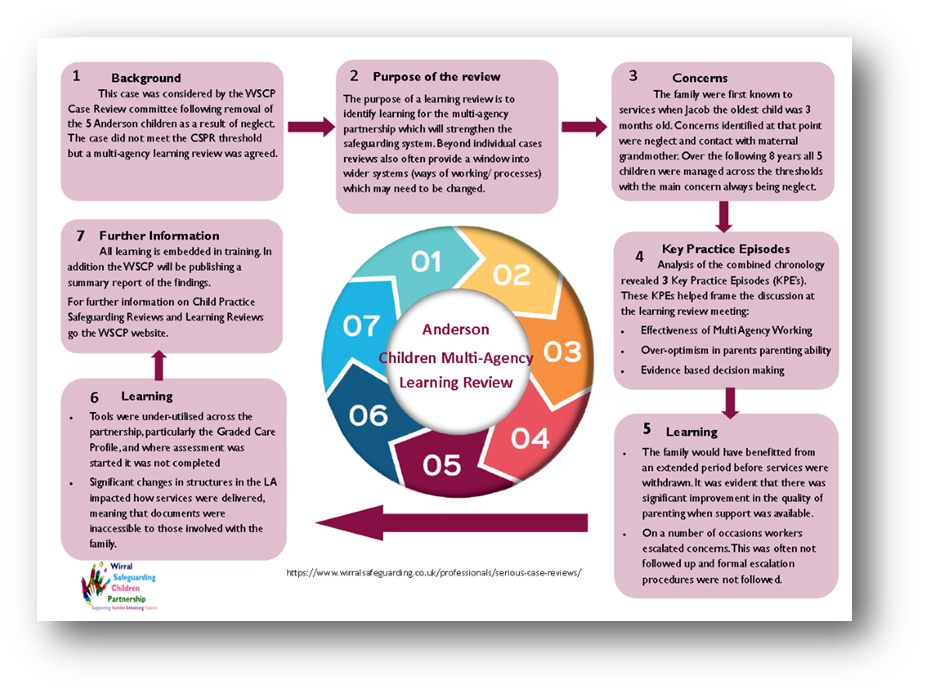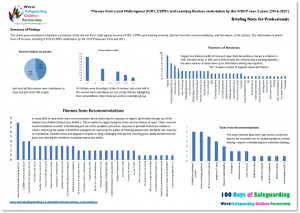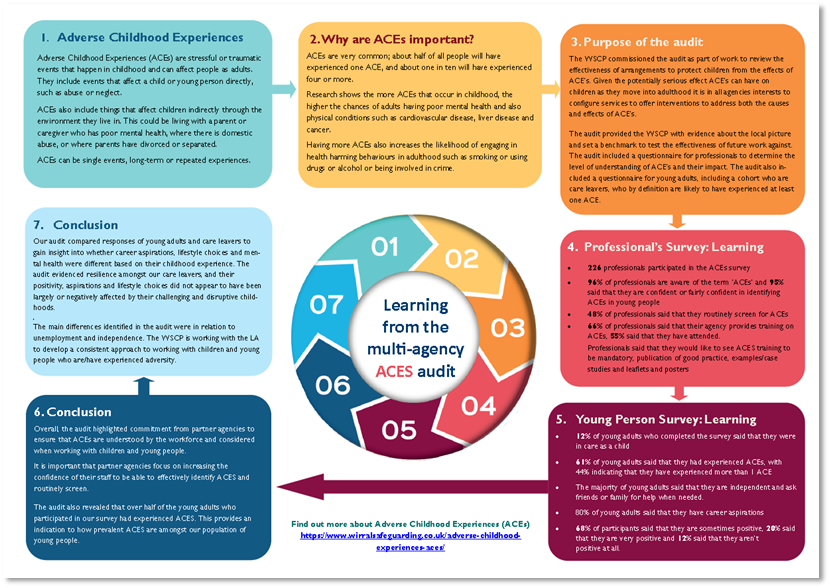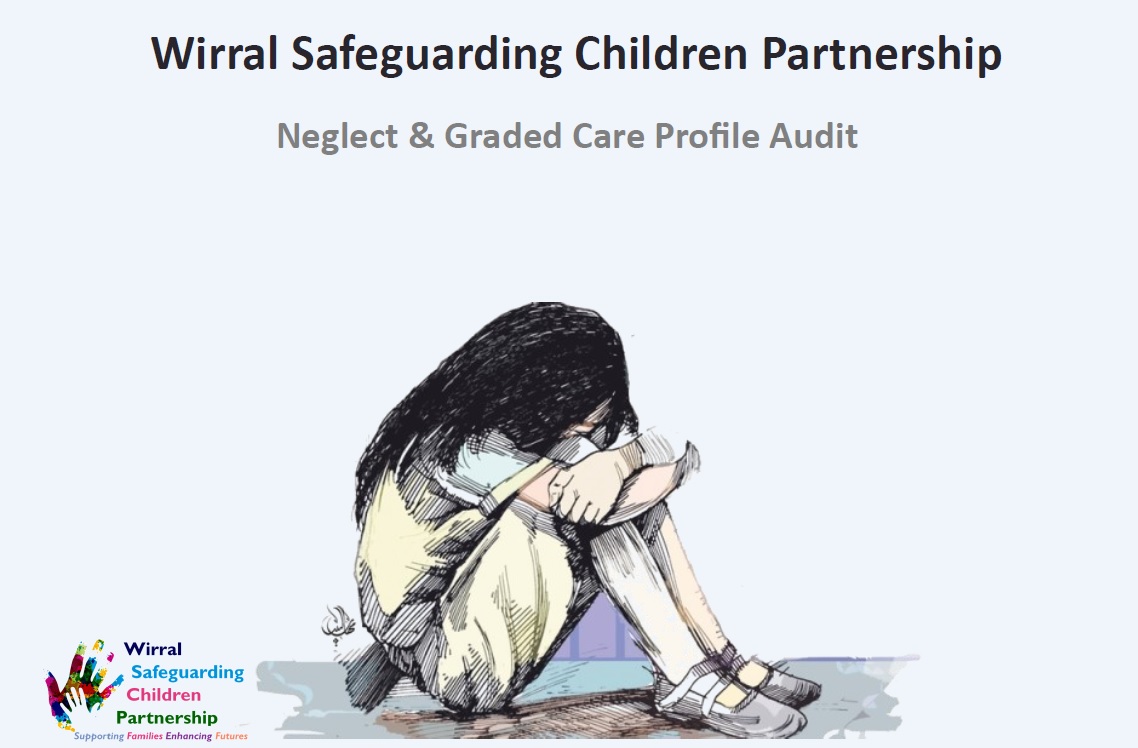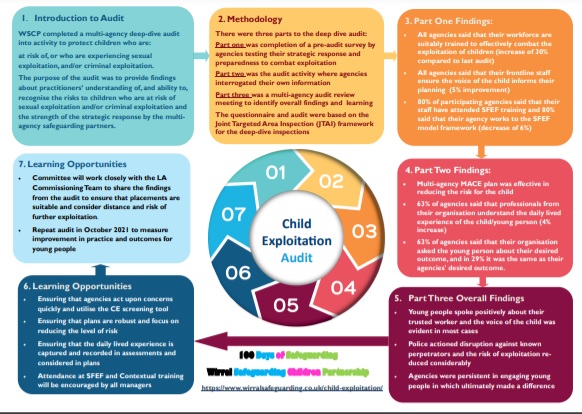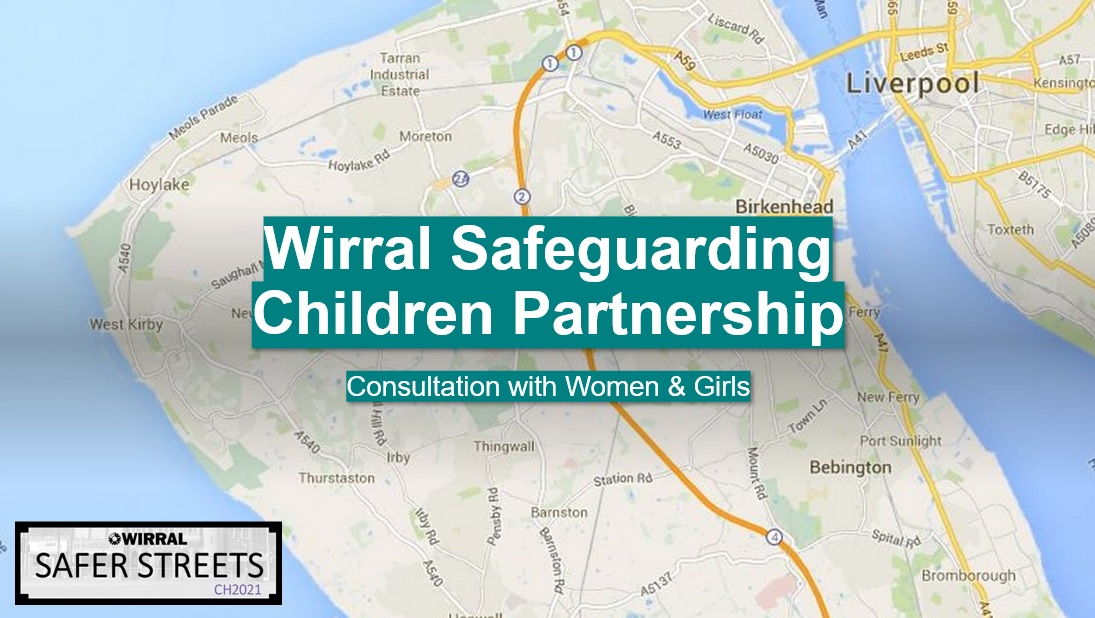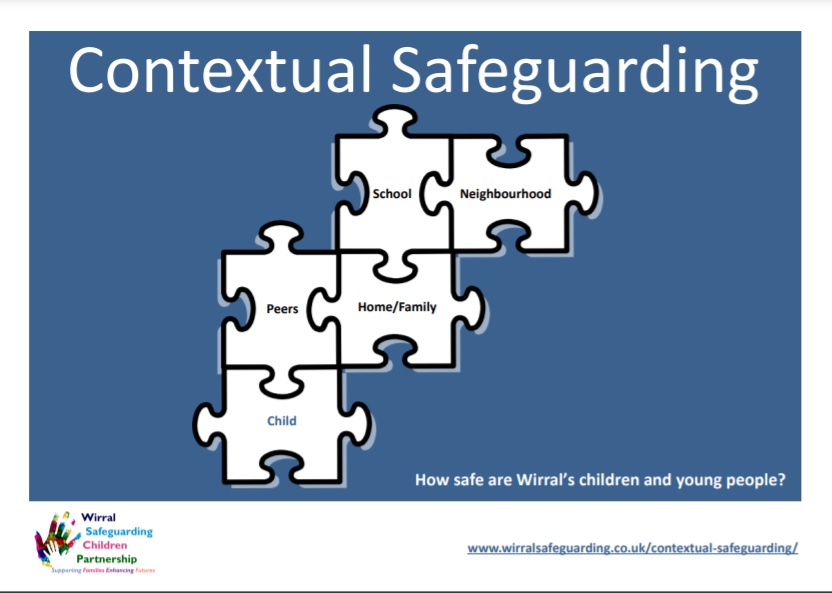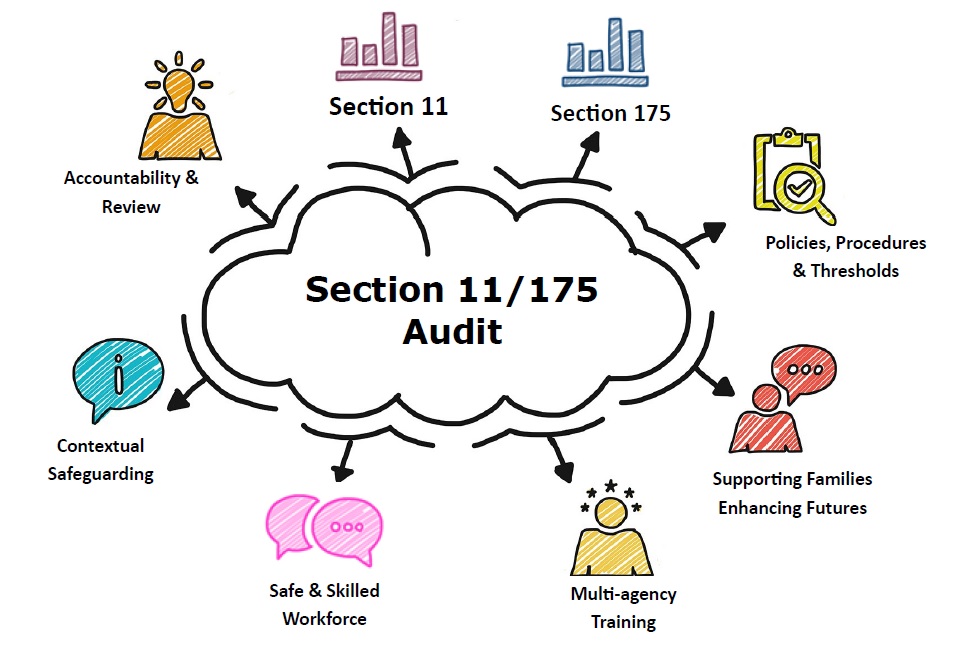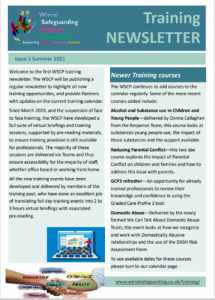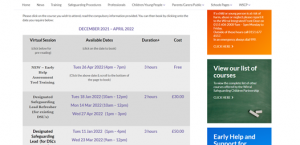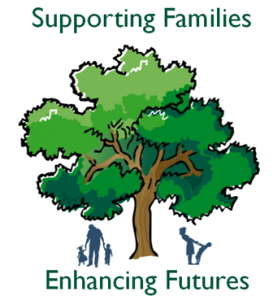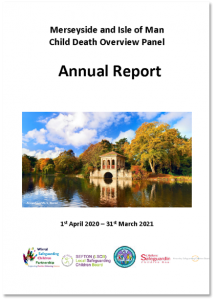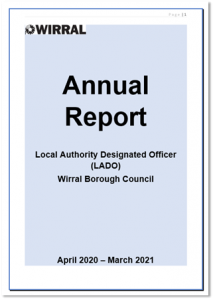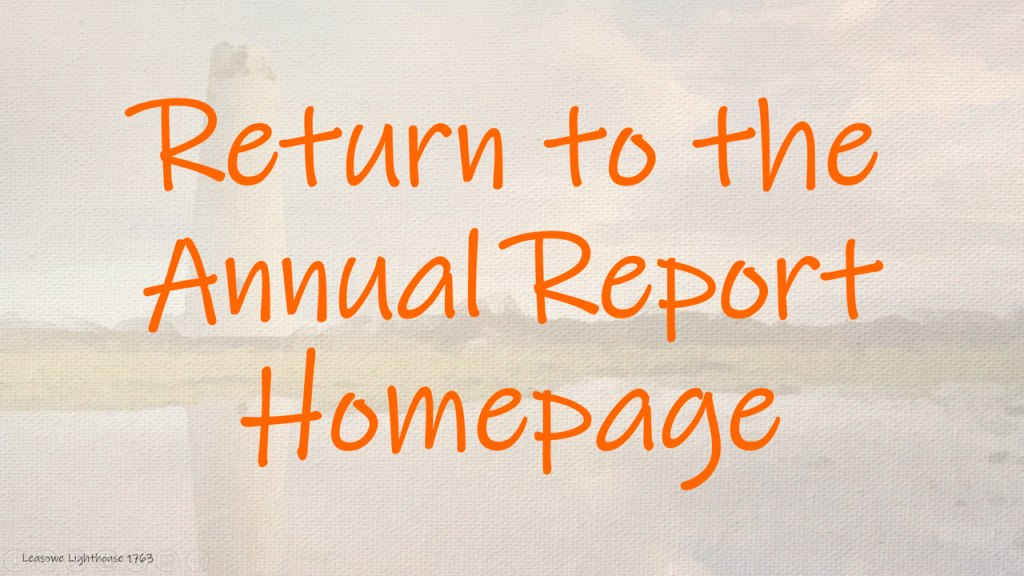Annual Report 2021 WSCP Key Activity
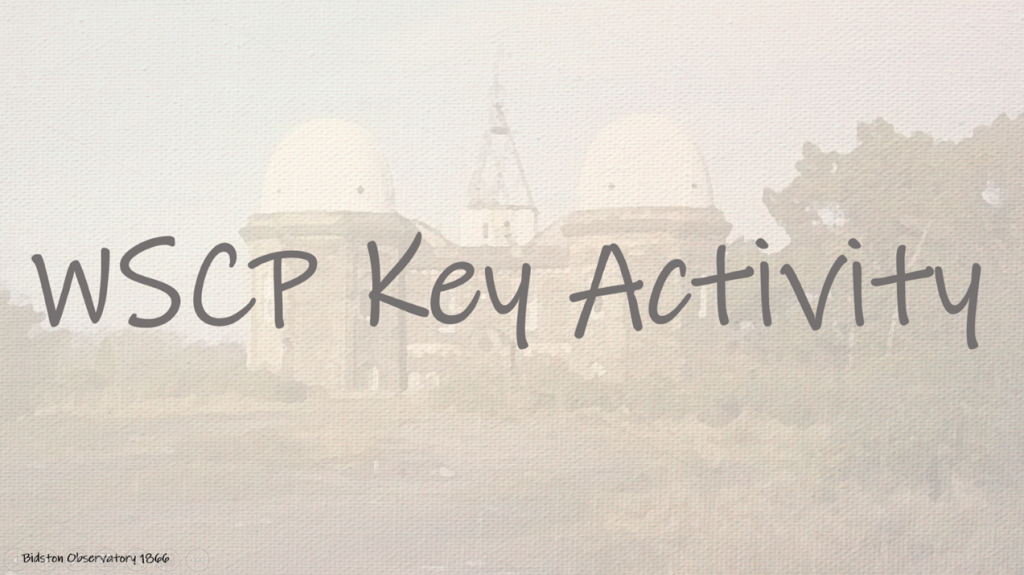 On this page you will find information about:
On this page you will find information about:
- Case Reviews
- Multi-agency auditing
- Multi-agency training
- Training for schools and colleges
- SFEF report
- CDOP report
- LADO report
Case Reviews
The WSCP undertakes two levels of multi-agency reviews; cases which reach the statutory threshold for a review, and cases which don’t meet the threshold, but where local learning is likely. This section of the annual report details the cases undertaken by the WSCP in 2021 both at and below the statutory threshold. Further detail on these, and previous cases reviewed by the WSCP can be found on our dedicated Case Review webpage:
Case Reviews – Wirral Safeguarding Children Partnership
- Statutory Child Safeguarding Practice Reviews
The WSCP has a statutory duty to undertake reviews of serious child safeguarding cases which meet the threshold stated in Working Together to Safeguard Children (2018):
- abuse or neglect of a child is known or suspected and
- the child has died or been seriously harmed
The purpose of undertaking Child Safeguarding Practice Reviews (CSPR’s) is to highlight any improvements needed in the multi-agency safeguarding system to ensure children and young people are safeguarded, and to highlight learning points, and any recurrent or common themes. In summary CSPR’s are designed to be vehicles for learning and improvement.
When completing a CSPR the WSCP will publish a report on its website which will provide a summary of the case the identified themes, the learning and any recommendations. The recommendations will be translated into a multi-agency action plan overseen by the WSCP’s Case Review Committee. The committee will keep the action plan under review until all actions have been completed. Subsequent audit activity will evidence the embedding of learning.
The full CSPR process is detailed in the WSCP’s Learning and Improvement Framework, available below which details the referral pathway, liaison with the National Panel for CSPR’s, undertaking rapid reviews and steps leading to the publication of a CSPR:
Child Scarlet CSPR
In 2021 the WSCP published one CSPR: Child Scarlet.
Scarlet was removed from her parents’ care when she was very young, and lived for several years with the same Foster Carers. When Scarlet was 13 years old, she alleged that a former foster carer had sexually assaulted her. Scarlet had been living with a new foster carer for about approximately 3 months when she made this allegation. Other young people subsequently made allegations against this individual of assault, grooming and inappropriate behaviour. Following a strategy discussion the Foster Carer was arrested and Scarlet was moved to a temporary placement with different foster carers.
Nine months after Scarlet had made the allegation the Crown Prosecution Service (CPS) advised that the Foster Carer should not be charged in connection with the allegation. The following month the LADO investigation was closed as ‘unsubstantiated’. Scarlet was informed of these outcomes but it is not clear what support was given to Scarlet
Shortly afterwards the current Foster Carers indicated to professionals that they wanted Scarlet to be moved due to her poor behaviour, and ‘sexualised behaviour’. The detail of these concerns were not explored but Scarlet’s behaviour was also said to be deteriorating in school.
The placement began to break down, and following an argument Scarlet ran off from home and could not be persuaded to return. As no agreement could be reached for Scarlet’s return, arrangements were made for her to stay in a respite placement with another carer.
After having been living with the respite carer for six weeks, Scarlet was found in a state of collapse in a local park and was taken by ambulance to the ED. At the same time the male foster carer from the previous placement had been texting Scarlet, meeting up with her for tea and giving her money. Scarlet admitted that she had spent some of that money on vodka. This was reported to Children’s Social Care, but it wasn’t followed up.
Shortly afterwards another child made an allegation of sexual assault against the same carer, and about two weeks later, a second child also made an allegation of sexual abuse by him. Scarlet then told a member of school pastoral staff that the same carer had seriously sexually assaulted her earlier that year, and was giving her money ‘to keep her
quiet’. However, there is no evidence that a strategy meeting was held, or planned, to consider this.
A few days later Scarlet telephoned ChildLine and said that she was going to kill herself.
ChildLine alerted the police and Scarlet was admitted to hospital for a CAMHS assessment. Scarlet remained in hospital overnight and a possible move to CAMHS in-patient care was considered. The following day, however, Scarlet presented as quiet but bright and engaging and was discharged.
Two years after Scarlet had told the police that the male carer had sexually assaulted her, the CPS decided that no charges were to be brought against him. Scarlet continues to struggle with her mental health
Key Learning Points
- for professionals to understand adverse childhood experiences and be aware of the impact of trauma and neglect on children
- for professionals to understand the process following an allegation of child sexual abuse and make sure the child it supported at all stages
- for professionals to understand the managing allegations process, especially the implications for children of ‘unsubstantiated’ allegations
- for professionals to manage the expectations of young people in respect of
charging decisions by the CPS and the decision not to proceed with a prosecution - for professionals to always explore in detail any concerns about changes in behaviour with carers
Recommendations
- for the Fostering Service to provide training and learning opportunities for staff, specifically in relation to the managing allegations against foster carers process, challenging foster carers, mentoring of less experienced staff, developing critical reflection in practice, and ensuring staff have an overview of recent learning reviews
- for the Fostering Service to provide evidence of an audit of annual reviews of foster carers
- for the LA to detail the expectations it has set out/ intends to set in respect of ensuring that IROs are notified of serious complaints and allegations against foster carers looking after children whose care plans, they are reviewing
- for the WSCP to undertake a multi-agency audit of the management of serious complaints and allegations against foster carers
- for the LA to undertake a retrospective review of LADO enquiries to ensure that the correct outcomes have been reached and the correct actions taken
- for the WSCP to consider how it can best help professionals support looked after children who are the victims of sexual crimes and/or who make serious complaints or allegations against carers
- for the WSCP to require that agencies and organisations participating in this review provide evidence that proposed changes have been implemented and, where pertinent, an evaluation has been made of their impact on children
Full Report:
7 Minute Briefing for Professionals:
Learning Poster for Professionals:
Narrated 30 minute Briefing for Professionals:
2. Multi-agency Learning Reviews
At the time of writing (December 2021) the WSCP has four multi-agency learning reviews underway, but has not completed a review since July 2020 (the Anderson Children). Learning from that review is included below, and the learning from the current reviews will be published on the Case Review website in due course over the next few months:
Case Reviews – Wirral Safeguarding Children Partnership
Anderson Children Review
The Anderson Children case was considered by the WSCP Case Review committee following removal of the Anderson children as a result of neglect. The case didn’t meet the threshold for a statutory CSPR but the committee agreed to undertake a multi-agency learning review.
The review highlighted that the five young children in the family experienced neglect over a period of several years. The family were known to services since the first children were very young following concerns expressed about unsupervised contact with their grandmother, who had had her own children removed, and who was living with a registered sex offender.
Over a period of a few years, following a number of professionals visits to the family house where home conditions were described as being poor, the children were placed on a child protection plan. A Graded Care Profile (this is a tool used to assess the impact of neglect) was partially completed.
The case was subsequently stepped down through Child in Need and into Team Around the Child, which the family declined, although the review did not find evidence of effective interventions to reduce the incidence and impact of neglect.
Key Learning Points
- To examine the reasons why cases are stepped down to ensure there is clear evidence of a reduction in risk and improvement in outcomes
- For professionals to be trained in and use the Graded Care Profile 2 in all cases of neglect
- Emphasise the importance of agencies staying in touch with families when they move through different levels of the continuum of need
- For staff to be familiar with and use the multi-agency escalation procedure where disagreements exist
Recommendations
- Local Authority to audit a sample of cases where the main theme is neglect to ensure that appropriate intervention and support is in place and relevant tools (i.e. Graded Care Profile 2) are being utilised
- Local Authority to review a sample of cases which have repeatedly stepped up and/or stepped down in the last 12 months to identify whether there were missed opportunities for earlier intervention or if cases are being closed without a period of sustainability
- Partners to ensure that staff are aware of the multi-agency escalation procedure and that escalations are followed up and actioned in accordance to guidance.
Full Report:
7 Minute Briefing for Professionals:
Legacy of the Anderson Children Case
Following publication of the report and recommendations, the WSCP’s Case Review Committee developed a multi-agency action plan. The action plan has led to:
- establishment of neglect as a priority area for the WSCP for 2022-24, including the development of a new strategy and multi-agency approach
- undertaking of a multi-faceted audit of neglect by the WSCP. The findings of which are directly informing the ongoing neglect work
- establishment by Children’s Social Care of mandatory attendance at Graded Care Profile 2 training for all social workers
Combined Learning from Case Reviews
In July 2021 the WSCP reviewed the features, themes and learning from 14 statutory and multi-agency learning reviews undertaken over the past five years. The findings from this review are detailed in the attached graphic below. In summary the key findings are:
a. Cohort of Children
- 18 children were the subject of the 14 reviews
- 55% of the cases were about boys and 45% were about girls
- children in 95% of cases identified as white British
- 0-3 year olds accounted for 44% of cases; over 13’s accounted for 30%
- 28% of children had an identified learning need or disability
b. Themes of Reviews
- the 14 cases included 33 separate issues and themes
- neglect was a feature in 64% of cases
- parental alcohol/substance misuse was a feature in 43% of cases
- domestic abuse was a feature in 36% of cases
c. Themes from Recommendations
- in almost 60% of cases there was a recommendation about improving the response to neglect, particularly through use of the Graded Care Profile 2
- understanding and use of the escalation procedure was a theme in 30% of cases
- improving the multi-agency response to parental alcohol and substance misuse was a feature in 30% of the cases
- other common themes included improving the quality of transition arrangements; improving the quality of Fostering assessments; familiarity and response to exploitation, domestic abuse and disguised compliance; being challenging with parents; ensuring good quality assessments and plans, and ensuring the workforce is suitably trained and skilled
Multi-agency Auditing
The WSCP’s multi-agency Quality Assurance Committee leads, directs and supports coordinated multi-agency performance information, audit, scrutiny and review activity, which enables the safeguarding partners to assess the effectiveness of services for children in need of help and protection.
The WSCP Quality Assurance Committee produces quarterly reports for the safeguarding partners identifying themes, trends and risks in multi-agency safeguarding performance. The report is based on information identified and reported by partner agencies.
The group also undertakes multi-agency audits which inform recommendations and influence practice. The committee uses an audit action plan to monitor progress to actions and ensure learning is shared and embedded.
This year, the committee undertook audits on the following themes;
|
Adverse Childhood Experiences (ACES) The WSCP commissioned the audit as part of work to review the effectiveness of arrangements to protect children from the effects of ACE’s. |
|
Neglect & Graded Care Profile 2 (GCP2) The WSCP completed a series of audits, surveys and consultations with both professionals and families to measure; The findings from this audit were shared across the partnership and 7 multi-agency recommendations were made. The findings of this audit alongside learning from recent case reviews has prompted a larger piece of work for the partnership to ensure that the workforce is confident in identifying signs of neglect and utilising appropriate tools in order to measure the level of neglect and track progress, resulting in improved outcomes for families. Neglect will be a main focus for the WSCP in 2022. |
|
Child Exploitation The WSCP completed a multi-agency deep-dive audit into activity to protect children who are: The purpose of the audit was to provide findings about practitioners’ understanding of, and ability to, recognise the risks to children who are at risk of sexual exploitation and/or criminal exploitation and the strength of the strategic response by the multi-agency safeguarding partners. The audit identified challenges and good practice, and findings prompted 3 recommendations for the partnership. This audit will be repeated in 2022 to measure improvement. |
|
Violence against Women & Girls – How Safe do You Feel? Wirral Safeguarding Children Partnership (WSCP) lead a bid on behalf of the Local Authority for funding from the Home Office for an initiative called Safer Streets. WSCP hopes to use the funding to improve safety for everyone, particularly reducing violence against women and girls. Unfortunately the bid did not achieve primary funding from the Home Office, however, findings from the consultation revealed significant intelligence about the areas across Wirral where women and girls feel most unsafe. In 2022, WSCP plan to launch a campaign focusing on making Wirral safer for women and girls and will invite partner agencies to support and contribute to this plan. |
|
Contextual Safeguarding – How Safe are Wirral’s Children & Young People? As part of its response to Contextual Safeguarding, the WSCP designed questionnaires for young people to determine the issues and places where children and young people feel unsafe and for professionals to find out how aware they are of contextual safeguarding issues. The survey for professionals was agreed by the Contextual Safeguarding Steering Group and the survey’s for children and young people were piloted by The Hive and Youth Voice Group before circulation. The findings from the survey assisted the committee in designing, developing and implementing a Wirral Contextual Safeguarding Strategy to ensure a multi-agency response to identified contextual safeguarding risks. |
|
Section 11/175 Audit The WSCP is the key statutory body for co-ordinating and ensuring the effectiveness of arrangements to safeguard and promote the welfare of all children in Wirral. It is the duty of the WSCP to hold agencies to account in terms of their safeguarding arrangements and practices. The principle means by which this is achieved is via the Section 11 Safeguarding Audit. This year, the audits have revealed a universal commitment to safeguarding in Wirral and affirms that children are being appropriately safeguarded by agencies across the borough. |
Multi-agency Training
The WSCP began delivering live virtual training on Teams in July 2020 and the Training Pool have moved from strength to strength both in their confidence and their commitment to deliver excellent quality training.
All the WSCP training events have been developed and delivered by members of the training pool, who have done an excellent job of translating full day face to face training events into 2 to 3 hours virtual briefings, delivered via Teams, with associated pre-reading. Whilst there were always some concerns that delivering in a virtual format would lose some of the opportunity to network and interact with others as well, the Training Pool have embraced the challenge whole-heartedly, and consistently receive good feedback from attendees on their experience of the training. The training team very quickly developed a suite of training meaning the training calendar now has more training available than it did before the pandemic.
To see the training calendar, click here.
Attendance and feedback
Between July 2020 and September 2021, the WSCP delivered 94 multi-agency events to a total of 1,108 professionals, from all sectors. By far the largest number of attendees on the multi-agency training are from Social Care and Children’s Services making up 50% of all attendees, with the Health, Voluntary and Charity, and Education Sectors being the next largest groups of attendees. Below we can see a breakdown of the numbers by organisation.
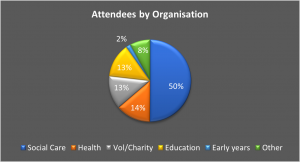
(Social Care includes Children’s Services; Health includes WUTH, CWP, GPs; Education includes primary, Secondary, Post 16/College/Alternative provision; Other includes Probation)
Whilst there was a slight dip in Health attendance at the height of the pandemic, attendance now seems to have increased again as some semblance of ‘normality’ resumes. We have also seen a slight rise in the number of Primary Schools attending, particularly in events like Supporting Families Enhancing Futures (SFEF) and Reducing Parental Conflict (RPC).
Feedback regarding the Virtual nature of the training has been very positive, alleviating some of our worries about losing the impact of the learning. Attendees have stated that they felt there was good interaction, that trainers were knowledgeable, and they found it helpful to listen to others’ experiences. They saw many advantages in doing the training online including; saving time and money in travelling to a venue; being flexible and being able to log on anywhere; and sessions being a lot more focused. The biggest disadvantage identified was the lack of networking and more ‘casual’ discussions that take place during face-to-face sessions. Even considering this, 97% said they would like to see some virtual training provision to continue moving forward
What’s new?

Reducing Parental Conflict Training
Reducing Parental Conflict Training was developed from a package that had originally been commissioned from an external organisation. Having spent some time updating the materials and making it useable for online training we delivered our first event in March 2021. Despite the challenge of delivering an event like this online the feedback has been very positive:
Training was very informative and interactive. Tools provided are also very helpful and will be used in my practice going forward.
Really enjoyed the insight into how it feels for children around parental conflict, and that it does not have to be as severe as domestic abuse to have an impact on their emotional wellbeing.
The course left me feeling more confident in recognising signs of PC and ways to approach it with parents. I liked that the training group was a small enough size to share thoughts and allowed everyone to speak when needed.
For more information on Reducing Parental Conflict click here
Domestic Abuse Training
With the formation of the new We Can Talk About Domestic Abuse Team, the WSCP was finally in a position to put Domestic Abuse back on the training calendar. The first event was delivered in August 2021. This training is the longest session the WSCP deliver running from 10am-3pm and caters for a larger number of participants. To date 30 people have attended the training and the feedback has highlighted a clearer understanding of the impact of domestic abuse on children in the family.
I was in a group we had the child category of mum still pregnant. I found this a real good insight in to how this effects not just mum but baby as well.
I work in school attendance so it was helpful to think about domestic abuse more deeply and how this may be impacting some of the young people I work with and that it may be a reason for poor school attendance and should be explored.
A greater understanding of how domestic abuse affects children and families
For more information on the Domestic Abuse training please click here
Alcohol and Substance Use in Children and Young People
This event came about as a result of a conversation with a colleague at Response regarding professional’s lack of confidence in addressing substance use with the young people they are working with. Response delivered the first event, in collaboration with the WSCP, in February 2021 and the events filled up very quickly when they were advertised which demonstrated this had been a training gap for a while. This training event is delivered to a smaller group as feedback was people appreciated the opportunity to really explore the issues for young people. This event is one that runs more frequently than many of the other events on the WSCP calendar. In the period February to September 110 professionals attended the sessions.
Really enjoyed the sensory star and will definitely be using this in my own practice.
Harm reduction messages were very helpful
This has given me more confidence in my ability to discuss the topic with young people and carers on my caseload
To access the Alcohol and Substance use training click here.
Newsletter Autumn term
The WSCP often sends out training updates via email to the Partnership, highlighting new training opportunities. It was decided a more efficient way of sharing this information would be via a published newsletter once a quarter. Our first newsletter was published at the beginning of September, setting out training dates for all upcoming training, highlighting what is new, and sharing some feedback from both the training attendees and the Training Pool. This first edition was well received, and the next Autumn issue can be accessed below:
Virtual Learning Event
With the onset of the Covid 19 pandemic and the associated restrictions, the planned Annual Learning Event had to be cancelled. Not wanting to lose the opportunity to hold a learning event the WSCP decided instead to create a Virtual Learning Event hosted on the Safeguarding Partnership website. The learning event is in two parts – recorded presentations on a particular safeguarding theme, and a market place with a series of short presentations from a range of different organisations, aiming to raise awareness of services available for children, young people and families living in the Wirral.
There are currently 23 safeguarding presentations on the Learning Event including topics such as Learning from Case Reviews, Contextual Safeguarding, Early Help Provision, and Domestic Abuse. These continue to be added to as new presentations are created.
In the market place we have presentations from organisations such as the Paul Lavelle Foundation, the Youth Justice Board, Caritas and Oomoo, amongst many others.
To access the Virtual Learning Event click here
Spotlight Sessions
The WSCP made the decision to start offering Spotlight Sessions. These briefings of no longer than an hour focus on a specific theme, with a new theme every 2 months. The first Spotlight Sessions delivered in September, were about the WSCP first published Child Safeguarding Practice Review regarding child Scarlet. 138 professionals attended the 4 dates in September, with the majority of attendees being from Social Care. Whilst no formal feedback was sought for these sessions, anecdotal feedback is that attendees found the session very thought-provoking and that there was an appreciation of the need to sometimes take a step back from day-to-day work to reflect on practice issues.
The current theme for the Spotlight Sessions is about the ICON Babies Cry, You Can Cope campaign.
Longer term feedback
The WSCP sends out follow up evaluation forms to previous attendees on training in order to establish how the training assists with practice and improving outcomes for children and young people. These follow up questionnaires always have a very poor response, despite only taking a few minutes to complete. At the time of this report 50 were returned from over 200 sent out. Despite such a low response rate, it does allow us to explore specific examples of how training has impacted on work practices.
Below are some case studies giving these examples.
I was asked to update a GCP2 for a family where the children were already in local authority care due to Neglect– I felt more confident in the measuring and appointing scores following my training however I also felt confident to challenge the request for the GCP2 as the children had already been removed from mother’s care and I remembered being advised that you cannot use the tool to measure previous neglect, it has to be the child’s current lived experience which meant the only section I was able to update with Mum was the current home conditions to educate Mum in what the concerns were and to help her see what had and had not improved, Mum was being asked to work with me on improving the home conditions despite the removal of the children so the tool was used to show Mum what she needed to be aiming for in comparison to where things were at that time.
I have used the GCP2 tool was for work with the Grandparents of a child who had been removed from an extremely neglectful environment, due to the home environment, physical neglect and emotional neglect. Grandparents were assessed for viability and had a negative assessment due to their limited understanding or acknowledgement of the neglect the grandchildren experienced. The GCP2 tool along with NSPCC materials about Neglect was used to educate them about neglect, about the concerns of Social Care which led to the children’s removal and to increase their understanding of what neglect looks like and the levels of care we expect every child to be afforded. I have just completed my work with the Grandparents and have been able to measure an increased understanding about Neglect and awareness of what we mean by emotional neglect.
After completing training for EHAT I had a much clearer understanding of the information that is needed in order to make sure that the family and their needs are portrayed within the process. When completing my first EHAT after training, I used the prompt sheets of which I downloaded from SFEF on the WSCB website to support me with discussions I had with the parent. I found this very useful because the parent could use it to remind them of what has been asked, the conversation can sometimes move away from what has been originally asked and it was a good way to redirect back. The prompt sheets also helped me as a practitioner to get the right information down. Although I have not yet completed the ‘understanding the world of the child’ section of the EHAT just yet, I will use the prompt sheets to help me with getting the information that is needed in a child friendly way. I have also used the distance travelled tool which I had never used before. I used the tip of the iceberg example when explaining to the parent the reasons for completing the EHAT for them. This was a great way to show them that sometimes we do not have the full picture and it is important that we have an understanding of life from their point of view, so that we are able to support them or direct them to the support that is right for them.
A colleague and I were made aware that one of our learners was possibly using a particular substance out of college. The knowledge that I’d gained from attending the session (alcohol and substance use in children) informed me of the particular effects of taking the substance, and how it would possibly affect the learner in college. This enabled me to make a more knowledgeable contribution to the discussion with colleagues about the situation.
Moving forward
Looking forward to the next 12 months one of the biggest decisions for the Partnership to be considering in terms of training, is when we will be able to move back to some face-to-face delivery. Feedback from attendees show that 99% of them would like some Virtual training to continue so it may be an opportunity to have a more hybrid training calendar for 2022.
Training for Schools and Colleges
Introduction and the training offer:
Wirral Safeguarding Children Partnership’s commitment to an Education specific safeguarding offer is now in its third year and continues to thrive.
The safeguarding training and support offer includes statutory safeguarding training for educational staff, training for governors, Designated Safeguarding Lead training (DSL), plus packages such as safer recruitment, managing allegations and ‘prevent’ update sessions. The support package also offers a safeguarding ‘Health Check’ on site to schools, and model safeguarding policy template which is updated annually, and regular safeguarding updates on the dedicated school web pages, which can be accessed here: Schools Pages – Wirral Safeguarding Children Partnership.
In 2020, the ‘virtual’ training offer was introduced and each session ranges from between 1.5 hours and 3 hours in length and has pre and post session reading to further support learners. Educational establishments on Wirral can source training and support from WSCP in a variety of ways. The most popular is accessing the website to book onto training below:
Continued Impact of Covid-19 Pandemic:
As the pandemic continued through 2020, Covid-19 professionals were unable to access school safeguarding training face-to-face. To mitigate this the partnership’s Education and Training Officers developed a WSCP began delivering live virtual training sessions on Teams in July 2020 and this continues to date, due to the flexibility of this type of session for the Education sector.
Headlines / Achievements in 2020 – 2021:
Training & Support: The project has been able to support over 110 educational settings and over 30 external agencies, many of which have been from the Early Years sector in the last 12 months. The Education Officer has delivered 56 scheduled training sessions (an increase of 34%), many which were virtual sessions during lockdowns. In addition, the Education Officer delivered 29 sessions across Wirral, most additional sessions were on-site bespoke ‘whole staff safeguarding’, Prevent or DSL sessions for schools, Early Years sector, and external agencies. Also, 5 ‘Safeguarding’ Health Checks were carried out on school sites and action planning for each school is in place.
1. 84 % of all Wirral schools accessed training (an increase of 11% from last year)
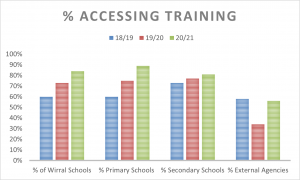
*External agencies include – Stick n step / Merseyside Fire & Rescue / Early Years settings, etc.
- Over 1500 educational staff have been trained over the year
- 81% of all Wirral secondary schools accessed training (an increase of 4% from last year)
- 80% of all Wirral SEND schools accessed training (an increase of 22% from last year)
- 89% of all Wirral primary schools accessed training (an increase of 14% from last year)
- 42% of all Wirral Designated Safeguarding Lead’s (DSL) accessed Wirral Safeguarding Children Partnership DSL training
Attendance on training:
Attendance in the sector remains consistently high, with less than 1% of all attendees having to cancel. The main reason for cancellation being service needs, particularly Designated Safeguarding Leads (DSL’s) having to cover safeguarding arrangements at short notice.
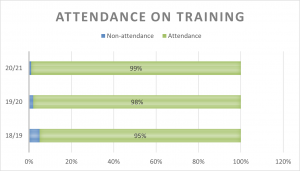
Income generation:
The safeguarding training offer has also been extended to support Early Years providers, nurseries and childminders and a further contract was secured facilitating training for the DSL team staff across Wirral and West Cheshire on behalf of Edsential.
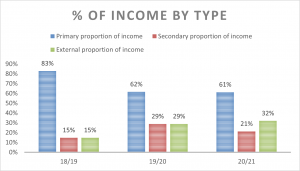
32% of the total income generation was from external agencies.
Safeguarding Training and Support Offer – Impact upon practice:
Training Sessions: virtual training has become part of the Partnership’s training offer since the beginning of the pandemic and will continue to be a source of learning and development for the education sector moving forward. The evaluation process has been adapted to capture the learner’s views about changes to the offer and is collated electronically via MS teams. Examples of feedback are as follows:
To what extent did the pre or post learning/virtual event meet the objectives?

100% of all delegates that completed an evaluation said that the training had updated their safeguarding knowledge and met the learning objectives. 99% that they were ‘very satisfied’ with the session content.
What were the key learning points from the session and how will they impact on your practice?
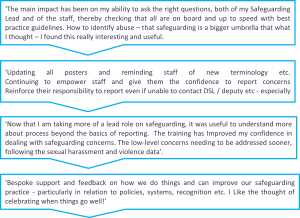
Do you have any other comments?

All comments and feedback are reviewed and sessions are adapted to suit the needs of learners. For 2022 and beyond, a mix of virtual training and face-to-face training is to continue. A new ‘safer working practices’ session was introduced this year which combines safer recruitment and managing allegations sessions to ensure that organisations can be smarter with their time management and CPD responsibilities.
The Safeguarding Health Check:
Aimed at providing an independent evaluation of the robustness of safeguarding procedures within an educational setting, the Education Officer carries out a document review, a website check and provides a ½ day on-site audit, observing practice, meeting with leaders, speaking to governors, key staff and completing a document review. The result of which is an action plan for the setting to complete and support the completion of the section 175 audit tool.
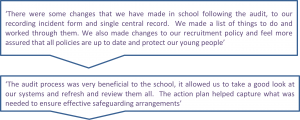
All schools that have had a safeguarding health check and have had subsequent Ofsted inspections reported back that the action plan was an extremely useful reference document.
Model Safeguarding Policy Template
The Education Officer provides an annual model safeguarding policy template for educational settings and other agencies, so that they can adapt the policy for their own setting. It aims to provide the most up to date information educational setting will need. A ‘Prevent’ policy template has also been devised and shared in 2020 for the sector to use if needed.

The non-profit making project that continues to adapt and respond to the safeguarding needs of schools and educational settings.
SFEF Report
Supporting Families Enhancing Futures (SFEF) is Wirral’s agreed multi-agency approach for working with children, young people and families. It was developed locally and introduced in 2017. The past 12 months have seen a comprehensive review of SFEF take place, which will result in an update and refresh of the model during 2022. There is a considerable amount of information about SFEF published on the WSCP website which can be found here.
SFEF training and support to embed SFEF within service areas
The multi-agency Introduction to SFEF training is delivered monthly via Microsoft Teams. The session covers the evidence behind Wirral’s Practice Model and how it underpins how we assess, plan and review need and risk for children and families, across the continuum of need. Within the training, we explore the lived experiences of Gemma and her children, to understand what life is like for them, from their perspective. We then follow the family’s journey through the Child Protection process from assessment, Initial Child Protection Conference, planning and review. The process for Level 3 is also highlighted.
We recommend that all professionals from across the partnership, attend the SFEF training as part of their Induction Programme.
SFEF training has also been delivered to several services and organisations from across the partnership, upon request. These training sessions have supported the participants to fucus on how their service area will develop and embed the SFEF approach.
One of the service areas being supported to embrace SFEF, is the Fostering Service. Training and support sessions have been delivered to the Fostering teams, Foster Carers and the Fostering Panel. This will continue to be developed next year.
To ensure the commissioned training for children’s social care is SFEF compliant, the SFEF Practice Lead meets with the providers to give an overview of the practice model and how it is referenced to within the training. This is supporting the consistent message that SFEF is Wirral’s practice model that underpins our work with children and families.
SFEF resources
To extend the learning from the SFEF training, there are several resources that can be accessed on the WSCB website. These include (click each one to find out more):
- Effective and SMART Planning
- Prompts for Practitioners
- Guide to capturing daily lived experiences of children and families
Family Time recording
Family Time is when looked after children spend time with their birth parent(s) and siblings. When Family Time is court ordered to be supervised, the sessions are recorded.
The Family Support Team, within children’s social care, have embraced using the SFEF approach and now record Family Time sessions considering what the experience is like for the child(ren) when they have contact with their birth parent(s). This approach is now being extended to the organisation that have the contract with the Local Authority to supervise Family Time and with the support of the family support team and SFEF lead, Family Time records are now more focused on the child(ren) and the impact for them of spending time with their parent(s).
Providing information for assessment
To support professionals to provide quality information for assessment i.e. Early Help Assessment (EHAT) or the Single Assessment, for Children’s Social Care, there are templates available to ensure the information that is provided, captures what professionals are worried about and the impact of concern, for the child(ren). The templates use the SFEF approach: What are you worried about? What is the impact for the child? What needs to change? How will this be achieved? Who will support the family to make changes? And when will this be completed by?
Review of planning and review templates for Children’s Social Care
During 2021, the templates for plans for children and families were reviewed and updated to ensure they are SFEF compliant and consistent across the service areas. This included: Child in Need, Child Protection, Children Looked After and Leaving Care Pathway plans.
We know from case audits, that it was often difficult to evidence the progress of the CiN, CP, CLA plan and the impact it was having for the chid(ren), from the core group meeting minutes. The plan was often the last thing to be discussed at core group meetings, with the main content being reported on being general information shared by professionals and the parent or carers, rather than an update on whether actions had, or had not, been completed, and the impact for the child(ren).
This piece of work was undertaken by the Practice Improvement Team and representatives from frontline social workers, team managers and IROs and the Children’s Systems Team.
A significant outcome from this piece of work, is the care plans now having an additional column, where the updates of each action, are updated within the plan. The information captured from the core group meeting, is pulled through to the body of the updated plan, in Liquid Logic.
There are also sections beneath the plan, where significant events can be added and any new concerns or risks to the child(ren) can be noted. There are clear instructions on the template, of where this information is to be copied and pasted to, as this section does not pull through on the Liquid Logic system.
There is guidance available for social workers in the Social Care Teams Channel.
SFEF Links Forum
To support the development and embedding of SFEF across children’s social care, SFEF Links have been identified within each team. The SFEF Links work with the SFEF Practice lead, to share good practice, identify where there are gaps and ensure there is information going into every team to keep SFEF on the agenda at team meetings and development sessions. The SFEF Links Forum is held monthly.

Feedback from children and families
As part of children’s social care monthly thematic case audits that are undertaken by the Practice Improvement Team, feedback is captured from children, parents and carers, to understand what difference the support they receive from children’s social care is making to them.
The information is captured by the SFEF Practice Lead making phone calls and asking about what the family’s experience is regarding: what is going well with the support they receive, the relationship they have with the social worker and if they feel listened to, what could make the support better, their involvement and understanding about the plan for the children and what they are proud about for their family.
Since October 2020 and November 2021, the feedback has provided key themes which are informing areas for improvement and areas that are going well.
Things that are going well include:
- Parents and carers feeling supported by the social worker and listened to
- During the COVID 19 Pandemic, families commented that they were supported even though the level of visits and meetings were reduced
- Having a social worker is identified as being a way to get support for the child and family including referrals to services, support with housing and support with education
- Most families receive support from other services as well as social care with health, family support and schools being mentioned most
- Parents and carers like the SFEF Traffic Lights system; feedback identifies that families understand the system and find it helpful to be able to see what it is that people are worried about. It provides an incentive for them to make changes and see the reds and ambers decrease and greens increase
- When asked what was going well for their child(ren) parents and carers were able to identify things that are improving with having support from the social worker and other services
- Being asked what they are proud of prompted positive feedback about their family strengths, although it took some parents/ carers a little time to respond
Areas identified as needing to improve include the turnover of social workers and the impact this has for the children and families, such as information having to be shared lots of times and forming new relationships; consistency regarding what different social workers offer; families report that they do not feel part of the child’s plan or do not really know what the plan is, for their child(ren).
How we capture and use the feedback from children and families, will continue to be developed, as it provides a unique insight into their experiences of receiving support.
SFEF moving forward
The SFEF Practice Model has been informing practice since Autumn 2017. During those four years, the landscape has changed in Wirral, including the impact of the pandemic for children, families and services.
The WSCP have agreed, that following the review that was undertaken earlier in the year by Stockport Partners in Practice, and the information captured by the internal review that has been ongoing through 2020 and 2021, the SFEF Practice Model will be developed in 2022.
The review undertaken by Stockport and the subsequent internal review by the WSCP identified that:
- SFEF is well known by professionals in Wirral
- Where it is embedded it is used effectively
- It isn’t universally embedded and its use is patchy across and within agencies
- The traffic light system is very well regarded by professionals and families
- Families like the inclusivity of the model and feel work is done with them rather than done to them
- The use of the portal for sharing multi-agency information is problematic
- Not all professionals like using SFEF, particularly as a risk assessing model
In response the WSCP has set revising SFEF as a priority area for 2022-24. The WSCP wished to retain the positives of the model and build on them whilst adding good practice from other approaches and models. In December 2021 the WSCP agreed to centre the future development of SFEF on a systemic practice approach and will establish a multi-agency steering group to take the work forward.
Child Death Overview Panel
Wirral is part of the pan-Merseyside CDOP (Child Death Overview Panel). CDOP is a statutory function and involved the multi-agency review of every child death in Wirral to identify any learning, especially when the death was unexpected. Merseyside CDOP exists to:
- provide oversight and assurance of the new Child Death Review processes and ensure that it meets the required statutory standards.
- review all infant and child deaths under 18 years of age. This includes neonates where a
death certificate has been issued, irrespective of gestational age. - identify and highlight any modifiable factors, and bring these to the attention of strategic partners, including Health and Wellbeing Boards, Safeguarding Children
Partnerships and Community Safety Partnerships where necessary.
The following summary information for Wirral was drawn from the Merseyside Annual Report. The full report, including CDOP membership and terms of reference can be read here:
Number of Deaths
During the CDOP reporting period (April 20-March 21) 88 child deaths were reported in Merseyside (and 2 in the Isle of Man, who became part of the Merseyside CDOP this year). There had been 83 the year before. 15 deaths were recorded of Wirral children (11 male, 4 female). The figures for Merseyside can be seen in the chart below:
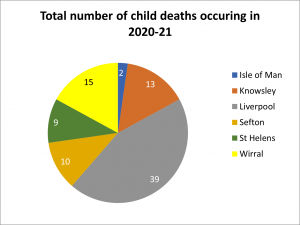
Categories of Deaths
The category for each death is shown in the chart below. Deaths of Wirral children reflected the pattern across Merseyside and included:
- perinatal/ neonatal events
- genetic and congenital abnormalities
- malignancy
- acute medical or surgical condition
- unexpected or unexplained death
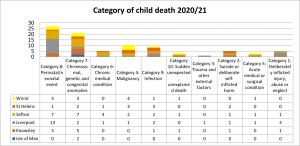
Headline Data for Wirral
2020-21 data. 2019-20 figures in brackets.
- 69.2% of deaths reviewed during 2020/21 were completed within 12 months [78.6%]
- 42.9% of deaths were expected [70.6%]
- 53.8% of deaths were children under 1 year of age [57.1%]
- 23.1% of deaths had modifiable factors identified [35.7%]
Modifiable Factors
A modifiable factor is one which may have contributed to the death of the child and which, by means of locally or nationally achievable interventions, could be modified to reduce the risk of future child deaths.
The proportion of child deaths where modifiable factors were identified is shown in the chart below:
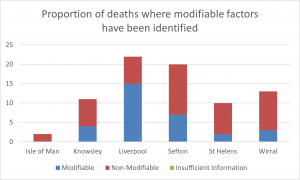
40% of cases had modifiable factors, which is higher than the national average of 34%. However, only 22% of Wirral cases had modifiable factors which is considerably lower.
The most frequently occurring modifiable factors in Merseyside were (in ranked order):
o Alcohol/Substance misuse (22%)
o Service issues (22%)
o Smoking by the mother/ parent/ or carer during pregnancy or in the first few years
of a child’s life (6%)
o Mental Health (5%)
o Unsafe Sleeping (4%)
o Mothers BMT (4%)
o Domestic abuse (4%)
o Neglect (3%)
o Criminality (2%)
The most common modifiable factors in Wirral were:
o Unsafe Sleeping (in one case)
o Criminal activity (in one case)
o Smoking in Pregnancy (in one case)
o Other/service issue (in one case)
Achievements during 2020/21
✓ Managed and maintained oversight of the Child Death Review processes during major
disruption to services due to the global Covid 19 pandemic
✓ Shifted seamlessly from face to face to virtual meetings, and established working principles and procedures
✓ Engaged with other CDOPs across the NW and nationally, and sharing good practice
✓ Circulated good practice, learning and tools across Merseyside e.g. Early Help Assessment Tool
✓ Provided support and guidance to local providers on processes
✓ Improved the quality of child death review meetings in a variety of provider settings to
ensure that CDOP received the necessary documentation
✓ Ensured that palliative and bereavement care services e.g. Clare House/ Alder Centre are actively involved in the child death review process, including the facilitation of CDR
Meetings and inclusion in CDOP.
✓ Ensured that exceptional care is recognised by writing to providers where care has gone
beyond that which might be expected.
✓ Oversaw implementation of safer sleep messages.
✓ Raised issues with national institutions
✓ Updated Sudden Unexpected Death protocol
✓ Advocated with other CDOPs for NCMD to produce national comparative data to facilitate better benchmarking, help set standards and help drive CDOP performance in terms of “completeness” and “timeliness” of child death reviews in the country.
✓ Supported Trusts in developing robust child death review meetings (e.g. Perinatal
mortality; hospital mortality; etc) to inform the CDOP process in a standardised/ structured manner
✓ Ensured that safer sleep messages were being promoted in a consistent way across
Merseyside
✓ Continued to collect data for Adverse Childhood Experiences (ACEs), and analyse patterns and links between ACEs and child deaths
✓ Reviewed Isle of Man child deaths
CDOP Priorities for 2021/22:
✓ Improve the quality and frequency of analysis forms from CDRM meetings
✓ Re-evaluate the role of virtually held panels and meetings following the covid pandemic
✓ Provide assurance that multi-agency partner strategies are in place to address modifiable factors
✓ Improve information provision from GPs
✓ Promote greater use of the CDR process and completion of analysis proformas
✓ Develop use of the Sentinel system for Isle of Man participants
Specific Recommendation for safeguarding children partnerships and health and wellbeing boards:
Assure themselves that through the various strategic partnerships there is an adequate
coordinated approach to reducing:
o Smoking in pregnancy and at the time of delivery (SATOD)
o Substance misuse
o Issues relating to high or low body mass index (BMI) before pregnancy
o Alcohol misuse
o Unsafe sleeping
Local Authority Designated Officer for Allegations Report
Local authorities are required to employ a LADO (the role can be undertaken by an individual or between a team) in accordance with Working Together 2018. In Wirral the LADO role is fulfilled by an individual officer.
The LADO is responsible for the management and oversight of individual cases whereby an allegations is made against an adult who works with children in a position of power and trust within regulated activities, both paid and within a voluntary capacity. An allegation may relate to a person who works with children in regulated activity who has
- behaved in a way that has harmed a child, or may have harmed a child;
- possibly committed a criminal offence against or related to a child; or
- behaved towards a child or children in a way that indicates they may pose a risk of harm to children.
All allegations must be referred through to the LADO within 24 hours of identification, however immediate/interim safeguarding measures should be actioned as a priority, to include contact with Merseyside Police if there is suspicion a crime may have been committed against a child. Agencies and professionals must always follow their safeguarding procedures at all times.
The LADO is responsible for having oversight of any investigation and ensuring the relevant agencies are involved and that appropriate information is shared in a timely fashion. The LADO should provide clear advice and guidance to employers and voluntary organisations, liaising with the police and other agencies and monitor the progress of individual cases to ensure that they are dealt with in a consistent and timely manner, and in accordance with Data Protection and Human Rights requirements. (Human Rights Act 1998/Data Protection Act 2018).
Included below is a summary of the LADO Annual Report for 2020-21 as provided to the WSCP. The full LADO Annual Report can be found below:
Consultations
Prior to the spring of 2021 consultations with the LADO were not recorded on Liquid Logic, therefore any collation of data previously relied upon paper files held by LADO administrator. Prior to this period, it was becoming increasingly obvious that the data collation on employees who did not meet LADO threshold to progress to referral stage was at best patchy and not joined up, and at worse was being missed and/or lost.
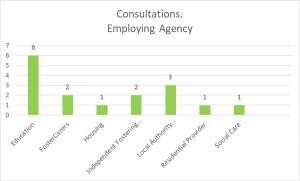
One of the primary roles within LADO is to support employers to build up a data profile on their staff in order that they can systematically assess repetitive lower-level practice concerns initially identified as training and practice issues, however repeated lower-level concerns, coupled with the employee’s unwillingness and/or inability to change canincrease concerns thus meeting LADO threshold. Collating consultation documents on Liquid Logic allows a data base of soft intelligence, often not held on police data bases which can be used as valuable information should this be required in the future in relation to employee practice.
Separately, employers are increasing using the consultation process to manage practice and training issues, and appear to have a deeper understanding, and more confidence in dealing with their own employment processes and implementing appropriate training and/or disciplinary measures.
With the LADO process now being able to collate data in terms of numbers of consultations, a trend is developing with a potential link to a decrease in numbers of referrals meeting threshold for LADO due to the impact of consultations being able to successfully identify and address the presenting concerns. If this trend continues and can be correlated with future statistics the impact will be that resources for addressing allegations that meet LADO threshold are protected, which in turn ensures timely and appropriate responses to the higher-level concerns.
Referrals
When examining numbers of referrals meeting LADO threshold during the past year, undoubtedly the numbers have been impacted by Covid19, and more specifically about a decrease in referrals from the education sector which is consistently the largest number of referrals from any one agency. This decrease in the numbers from education has resulted in a decrease in overall referral numbers.
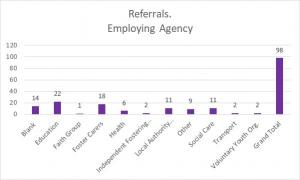
Referrals about foster carers have increased during this period, and arguably more liaison between the LADO and supervising social workers to include LADO delivering Managing Allegations training to supervising social workers has raised an awareness of safeguarding issues with foster carers.
Referrals from faith groups continue to be lower than one would anticipate in terms of numbers of provisions within Wirral, and I would suggest training within Wirral’s Safeguarding Partnership could be a way of increasing awareness and understanding of safeguarding to include more detailed focus upon safeguarding thresholds.
During the past year the number of recorded Allegations Meetings has consistently increased ensuring a record of the meeting with clear recommendations and timescales to ensure no drift. Previously, a significant and consistent fault within the process of Managing Allegations was the lack of records, and in turn Wirral LADO Service were unable to respond to requests from external agencies to include DBS, SWE and regulatory bodies for information in their pursuit of assessing registration and risk associated with their professional practice.
Wirral LADO continues to attend appropriate Child Strategy Meetings which in turn informs the LADO process.
Categories of Abuse
Physical abuse continues to be the highest category which is synonymous with the volume of referrals from education and foster carers, and whilst the original allegations may reduce in severity depending upon context, emotional harm is equally present in all allegations and robust assessment should always seek to identify emotional harm which in the longer term can have a more corrosive effect than one off allegations of physical harm. That said, this is not to condone or minimise the trauma any allegation of physical harm will have on a child/young person irrespective of force and/or context, and especially that children and young people have often been exposed to extreme trauma prior to becoming looked after.
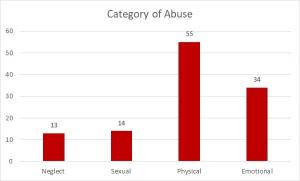
Professionals, to include teachers and foster carers should be wholly mindful of the impact of any conflict between themselves as trusted professionals, and triggers that can be invoked by the behaviours of said professionals. LADO reminds professional of the importance of understanding these incidents, and even if a professional emphatically refutes any culpability, as the adult in a position of trust, they should be able to explore and understand what happened and apologise to the child/young person for the incident escalating and not managing it more effectively. Increasingly where there have been lower-level incidents, difficult to ascertain culpability, the professional taking ownership of the process can be hugely effective in the child/young person reconciling and moving on more positively. With any newly appointed LADO posts requiring social worker registration, this is an example of the impact the LADO can have on promoting robust assessments and outcomes for children/young people.
Case Closures
Prior to 2020/2021, with poor recordings, the capacity to progress LADO closures has been delayed significantly due to gaps in information held. With amendments to LADO procedures, to include significant changes to the forms, closure documents are clearer in terms of what information is required, resulting in a more timely process and ultimately LADO closures expedited more efficiently.
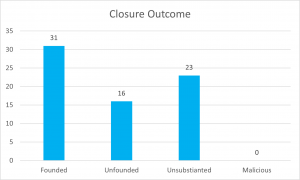
Whilst significant numbers of outcomes remain unsubstantiated, it is critical that professionals continue to manage the risks safely, therefore an example may be where a looked after child has made a serious allegation against a foster carer, and whilst criminal threshold may not be met, professionals should continue to manage the risks to explore all potential outcomes to include referrals to regulatory bodies based on potential risks as opposed to criminal conviction which is often unachievable based on a lack of forensic evidence.
Training
The LADO delivers the multi-agency Managing Allegation training for the WCSP. As well as the multi-agency training the LADO also delivers school specific training alongside the Education Training Officer.
The LADO also delivers training, upon request, to individual teams. Recently training has been delivered to Supervising Social Workers and Team Mangers within Wirral Fostering Service, as a result of a recommendation from a Child Safeguarding Practice Review.
More information about the Managing Allegations Training can be found here
Conclusion
During the period of this annual report Wirral LADO service has undergone robust changes to the whole process to include amendments to all forms from initial contact with the LADO service, through to police and agency closures. Initial enquiries and contacts are dealt with more promptly than previous to this period, and cases progressing to Managing Allegations meeting are similarly dealt with more promptly and progress in a timelier manner, police timescales including protracted investigations and court processes notwithstanding.
The LADO service has worked with intensely with Wirral Informatics/Technology Team and has been able to implement improved business support technology enabling smart methods of data collation. With significantly improved methods of collating data, future annual statistics, supported by monthly statistics will be able to used more effectively in order to analyse themes and trends thus informing and shaping future services based on relevance and need.
Quick Links to Chapters:
Introduction
Background
Journey of the Child
Multi-agency Working
Progress Against Priorities
Business Plan
Glossary

